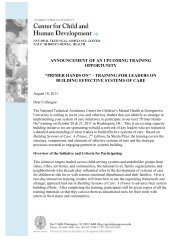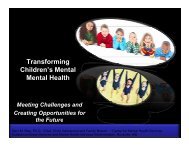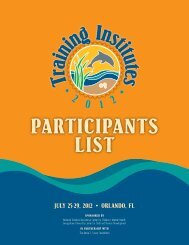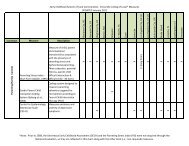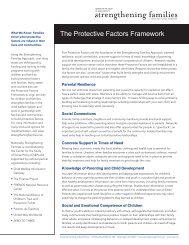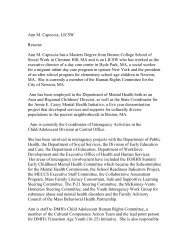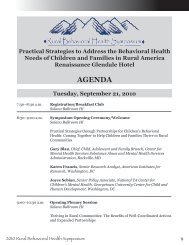Training Institutes 2012 - National Technical Assistance Center for ...
Training Institutes 2012 - National Technical Assistance Center for ...
Training Institutes 2012 - National Technical Assistance Center for ...
You also want an ePaper? Increase the reach of your titles
YUMPU automatically turns print PDFs into web optimized ePapers that Google loves.
NATIVE AMERICAN SERVICES TRACK<br />
NATIVE AMERICAN WORKSHOP #2 10:30 AM SATURDAY • DAYTONA 1-2<br />
Strategies <strong>for</strong> Improving Access to Services <strong>for</strong> Native Children and Families<br />
OBJECTIVES—Participants will learn:<br />
1. To identify strategies to improve access to mental health services <strong>for</strong> their children<br />
2. How to use practical tools from families that can help other families to access mental health services<br />
3. To examine common barriers to access to mental health and/or disability services <strong>for</strong> families<br />
4. To implement strategies <strong>for</strong> families to use their “Voice” to make their communities hear their needs<br />
5. To implement strategies <strong>for</strong> mental health providers to engage families and understand family perspectives<br />
This Workshop will focus on practical strategies <strong>for</strong> today’s Native families to access mental health and/or disability<br />
services in a system that is difficult to navigate <strong>for</strong> families. The strategies to be highlighted are a compilation of<br />
methods utilized by Native families, in both urban and rural settings, to overcome barriers experienced when attempting<br />
to access mental health and/or disability services and to create a “family voice” within communities. The in<strong>for</strong>mation<br />
and strategies to be highlighted are based on the experiences of two families, one that navigated children’s services<br />
agencies in Alaska and Oregon, and the other that navigated the children’s services system in Arizona.<br />
Specific topics to be covered include:<br />
• Statistics on the disproportionate diagnoses of mental health disorders among American Indian and Alaska Native<br />
(AI/AN) youth<br />
• Assessment of the challenges AI/AN families face when attempting to access services <strong>for</strong> their children<br />
• Strategies <strong>for</strong> AI/AN families to navigate the system, in both urban or rural settings, to be successful in accessing the<br />
mental health and disability services their children need<br />
• Discussion time <strong>for</strong> family participants to share their own stories about how they were able to successfully navigate<br />
the child-serving agencies to get their own children services in their communities<br />
• Discussion time <strong>for</strong> providers to share their strategies <strong>for</strong> improving access to mental health and disability services<br />
Participants will have an opportunity to engage in a discussion to share strategies they have used to successfully<br />
improve access to services from both the family’s and provider’s perspectives. The faculty team <strong>for</strong> this session will<br />
offer the perspectives of a Native family member, youth, and a community development specialist.<br />
MODERATOR/PRESENTER: Mark Anaruk, M.Ed., Community Development Specialist, Community Development,<br />
<strong>National</strong> Indian Child Welfare Association, Portland, OR<br />
Patricia Ocano, Pascua Yaqui Tribe—Sewa Uusim Program, Tucson, AZ<br />
Jasmine Ocano, Pascua Yaqui Tribe—Sewa Uusim Program, Tucson, AZ<br />
92 <strong>Training</strong> <strong>Institutes</strong> <strong>2012</strong>



